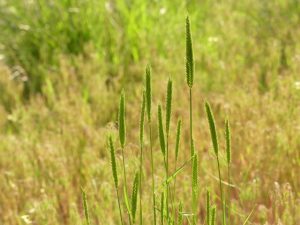My garden’s primary export is weeds.
I’m new at gardening – this is only my second year tending to this little plot of land in my care. So I try to have grace when I pluck more dandelions from the soil than I do vegetables.
I find myself thinking a lot about Jesus’s story of wheat and weeds — the Parable of the Wheat and the Tares, as we normally call it. He tells this story about wheat (God’s children) and tares (the evil one’s children) growing all together in a field. The two are allowed to grow together until, eventually, at maturity, the weeds will be gathered and burnt.
It seems that Jesus views humanity in two distinct types of people. The first sort of person is wheat, which is useful and good, the intended and desired children of God. The second sort of person are the weeds: unwanted, undesirable, competing with and detrimental to the health of useful plants like wheat.
Sometimes people are certain of knowing exactly who is in which category.
On the news recently, I saw a woman — she was at a protest for stronger border control between Mexico and US America. She was shouting: “Jesus wouldn’t break the law.” She was so certain that those labeled “illegal immigrants” are the weeds.
Across the country, Christians organize outside women’s health centers to pray for life while holding signs that say “murderer,” certain that the only reason a woman would need contraception or an abortion is because she is a child of the enemy, an invasive plant that chokes out life.
Many people are certain of knowing just who the weeds are. I’m not here to tell you that border-crossing children and pro-choice women are going to burn. Rather, I want to ask: how do you feel about the people who do say such things? Are you certain of their weediness?
Perhaps you work to follow God’s call to care for the orphan, the widow, and the foreigner — how do you feel about those who, in the name of the same God, oppose such a call? How do you feel towards those who actively work against caring for the orphan, the widow, and the foreigner? Perhaps their behavior seems not dissimilar to the way an invasive species of weeds hinders the goodness and usefulness of wheat.
Jesus’s parable, by sorting humanity into two groups, seems to condone this sort of classification of human souls, yet perhaps the story is not about the fact that humanity could be easily categorized into two groups, but rather the parable might be about the tendency, the desire to place humanity into two groups. Perhaps the issue is not that weeds exist; perhaps the issue is that our desire to name people as weeds does exist, and this breeds the desire to distance, to separate, to grow apart from those people.
As any gardener knows (and I am certainly learning), the presence of weeds may feel like a cause for battle. But, my wiser garden mentors tell me, weeds are actually a very useful tool. To the gardener who knows how to read the signs, weeds are an indicator of the condition of the soil. If the soil is too wet, it will attract certain weeds; if it’s too compacted, different weeds; if it is too acidic, too alkaline, too full of phosphorous — each situation will attract its own type of weeds.
A wise farmer pays attention to the weeds, digs down into the dirt to discover what they are indicating about the soil, and learns from their presence.
What we would like to tear from the field, remove from ourselves, and dismiss as problems are actually very useful tools, when we pay attention. When we want to remove something from the field, perhaps we would be wise to first move closer with curiosity.
Jesus tells us a crucial step in this work: “Let the wheat and the weeds grow together.” He does not say to let them grow at the same time, in parallel and yet separate from one another, but to let them grow together, their roots intertwined.
If we are wise gardeners, we will not ignore the people with behaviors that we might tend to view as weeds. If we are wise farmers, we will pay attention to what those weeds are indicating about the world in which they grow. We will not obliterate them, but will move closer to them to find out what is going on to grow such a plant — Move so close as to allow our root systems to become entangled and intertwined so thoroughly as to be inseparable. We will allow God to grow us together so intimately that the well-being of one plant is deeply connected with the well-being of the other. When our growth is intimately tied to their growth — whoever we might understand “them” to be — the field will be changed; and the flourishing of all people will be possible.
The protester that I mentioned earlier, the woman desiring stronger border control: if she spent time learning from the ones she calls law-breakers, perhaps she might be able to see their illegal weediness not as a core characteristic of their souls, but as a symptom of the soil of our world, a symptom of scarcity and globalization and desperation. The Christians outside women’s health clinics might be surprised to discover that those who enter such clinics often do so because of uncertain relationships and insufficient community support — deeper concerns in the systems of our world.
And if we allow ourselves to grow together with the Christians that make some of us want to say “I’m not that kind of Christian” –perhaps we can see them as symptoms of a struggling church in a broken world, if we can be wise gardeners. Perhaps we can recognize that what looks like hatred is the sincere attempt to follow the call of a God who is beyond all understanding in a rapidly shifting culture. Perhaps we can learn that what looks like hatred is fear of a God who is beyond our control; fear of a God who tells us to grow together with those we fear.
Please visit Kate’s website Here



2 comments
Thank you Kate. Very very thoughtful and well written:)
I didn’t know about different weeds being indicators of soil condition – although it makes sense. Please could you give me more details?